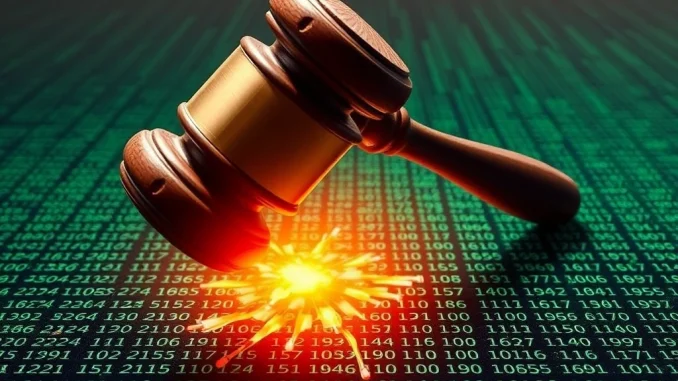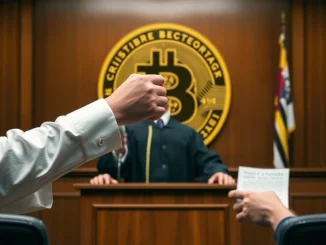
The cryptocurrency world is buzzing with concern as over 30 crypto firms, spearheaded by the DeFi Education Fund, have issued a powerful call to Congress. Their urgent plea? To inject much-needed clarity into the Department of Justice’s (DOJ) interpretation of Section 1960, a rule governing money transmitters. This isn’t just legal jargon; it’s a critical issue that could dramatically reshape the landscape for DeFi and non-custodial crypto technologies. Let’s dive into what’s fueling this industry-wide demand for regulatory certainty.
Why is Crypto Regulation Clarity So Crucial Right Now?
At the heart of the matter is Section 1960, a statute designed to combat illegal money transmitting businesses. While its intentions are noble – preventing financial crime – the crypto industry argues that the DOJ’s broad interpretation casts a shadow of legal uncertainty over non-custodial software developers. This interpretation, they contend, is not only stifling innovation but also potentially criminalizing activities that were never intended to fall under this regulation.
Here’s a breakdown of why this lack of crypto regulation clarity is causing such alarm:
- Innovation Chill: Vague rules discourage development. Imagine building cutting-edge DeFi tools only to face potential legal battles because the rules aren’t clear. This uncertainty can drive innovation overseas.
- Developer Threat: Non-custodial software developers, who create code that allows users to control their own crypto, could be unintentionally classified as money transmitters. This could lead to legal repercussions for simply writing code.
- Bypassing FinCEN Guidance: The crypto firms argue the DOJ’s stance sidesteps existing guidance from FinCEN (Financial Crimes Enforcement Network), the agency primarily responsible for regulating money transmission. This creates conflicting signals and confusion.
- U.S. Crypto Exodus?: If the U.S. becomes a hostile environment for crypto development due to unclear money transmitter rules, companies and talent might move to more crypto-friendly jurisdictions, weakening the U.S.’s position in this burgeoning industry.
The Tornado Cash Case: A Stark Warning
The letter explicitly points to cases like Tornado Cash as evidence of the DOJ’s expansive interpretation. Tornado Cash, a privacy-enhancing tool, became a target of regulators, raising questions about the extent to which software developers can be held liable for how their tools are used by others. This case has sent shockwaves through the DeFi regulation community, highlighting the potential overreach of current interpretations.
Consider these key points regarding the Tornado Cash situation:
| Aspect | Implication for Crypto Firms |
|---|---|
| Sanctioning of a software tool | Sets a precedent for regulating code itself, not just entities. |
| Focus on developer liability | Creates fear among developers, potentially hindering open-source contributions. |
| Debate on privacy vs. regulation | Highlights the tension between user privacy and regulatory oversight in the crypto space. |
What Exactly Are Money Transmitter Rules and Why Do They Matter for DeFi?
Money transmitter rules are designed to regulate businesses that provide money transmission services. Traditionally, this meant companies like Western Union or MoneyGram. However, the application of these rules to the decentralized world of crypto, particularly DeFi, is far from straightforward.
Here’s why it’s complicated for DeFi:
- Decentralization: DeFi protocols are often designed to be decentralized, meaning there isn’t a central entity that controls them in the traditional sense. Applying rules designed for centralized entities to decentralized protocols is a challenge.
- Non-Custodial Nature: Many DeFi applications are non-custodial, meaning users retain control of their own funds. This contrasts with traditional financial institutions that hold customer funds. The definition of “transmission” becomes blurry in this context.
- Code as Speech?: Some argue that code is a form of speech and should be protected. Regulating code, therefore, raises First Amendment concerns.
The Call for Action: Demanding Legislative Intent on DOJ Crypto Stance
The crypto firms aren’t just complaining; they’re actively seeking solutions. Their letter to Congress is a strategic move to push for legislative action. They are specifically calling for Congress to clarify its intent regarding Section 1960 and its application to the crypto industry. This isn’t about evading regulation; it’s about ensuring DeFi regulation is sensible, clear, and doesn’t stifle innovation.
What are they asking for?
- Legislative Clarification: They want Congress to explicitly state how Section 1960 should apply to crypto, particularly non-custodial software and DeFi.
- Protection for U.S. Developers: The goal is to create a legal environment that encourages, rather than deters, U.S.-based crypto and DeFi development.
- Alignment with FinCEN: They are advocating for the DOJ’s interpretation to be more aligned with FinCEN’s existing guidance, reducing conflicting signals and legal ambiguity.
Navigating the Uncertain Future of DOJ Crypto Regulations
The crypto industry finds itself at a critical juncture. The DOJ’s approach to DOJ crypto regulations will significantly impact the future of DeFi and non-custodial technologies in the U.S. The industry’s proactive call for clarity is a vital step in shaping a regulatory framework that fosters innovation while addressing legitimate concerns about financial crime.
What’s next?
- Congressional Response: The industry awaits Congress’s response to their letter. Will lawmakers take up the call for clarification?
- Regulatory Dialogue: Continued dialogue between the crypto industry, regulators, and lawmakers is crucial to finding a balanced path forward.
- Industry Advocacy: Expect to see continued advocacy from crypto firms to ensure their voices are heard in the regulatory debate.
In conclusion, the crypto industry’s demand for clarity on DOJ money transmitter rules is not just about legal technicalities; it’s about safeguarding the future of decentralized innovation in the United States. The coming months will be crucial in determining whether regulators and lawmakers can create a framework that fosters growth and clarity, or if uncertainty will continue to cast a long shadow over the crypto landscape.



